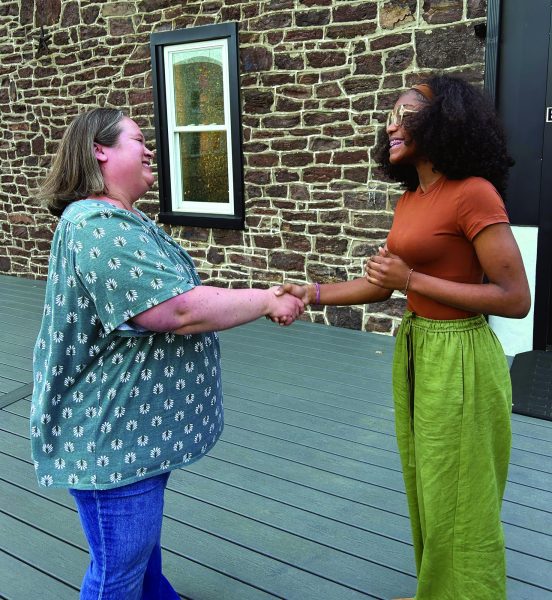Immunocompromised people share safety tips
By washing hands, limiting large gatherings, staying home when sick and taking care of your health, community members can help limit the spread of sickness this cold and flu season.
Staying SOap clean…Washing their hands, alumni Pockets Seachrist prevents the spread of diseases. Breaking the spread chain, Pockets prevents themselves and others from getting sick.
To keep themselves and others who are at risk safe in the Souderton community, members are advised to keep safety measures in mind with the recent rise of respiratory illness cases.
According to school nurse Jen Kaufman, there has been a rise in “respiratory illness” at school.
“Yesterday, we had a lot of students come in with a lot of coughing, a lot of fatigue, some aches, some have fevers,” Kaufman said.
Tri-County Urgent Care, Health and Wellness Center physician Noah Bass said RSV, COVID-19 and influenza are the main respiratory illnesses spreading around this year.
“I think that cold and flu season has come a little bit early and little bit more severe [this year] because we have three different primary illnesses all circulating in the community at the same time,” Bass said.
Junior Penny Dugan, who suffers from chronic bronchitis after getting COVID-19 last year, has been dealing with the repercussions of the cold and flu season this year.
Dugan has to carry an Albuterol inhaler with her and has multiple asthma attacks a day while also dealing with the stress physical activity from marching band has on her lungs.
“Every time I get sick now it’s whatever I’m sick with on top of the bronchitis,” Dugan said. “It’s just so much, when I get sick I’m sick for weeks on end now.”
Dugan’s mother has psoriatic arthritis which is an autoimmune disease. Dugan worries about bringing sickness home and having her mother end up in the hospital.
“It’s scary,” Dugan said.
Alumni Pockets Seachrist has juvenile idiopathic arthritis – another auto-immune disease.
“I have an overactive immune system that needs suppressants – so because of that I get sick very easily and I am very prone to infections,” Seachrist said. “ [Infections] usually need a lot of antibiotics and medicines so that can be very time-consuming because I don’t heal like a normal person.”
Seachrist’s arthritis affects their mobility and creates chronic pain. This additional factor makes illness very disruptive. Seachrist said that it takes them much longer to recover from sickness as well, sometimes “triple the amount of time.”
Seachrist said there are so many simple ways to prevent the spread of sickness like hand washing.
“If you carry a hand sanitizer with you and you use that, boom you just stopped so many germs from getting to so many places,” Seachrist said.
Kaufman also recommends hand washing, along with following school sick day guidelines and limiting large indoor gatherings when the rates of infection are high in the community. “If you are not feeling well and you have symptoms that meet our sick day guidelines, you should stay home from school,” Kaufman said. “If you run a fever, we consider a fever 100.0° or higher, you should stay home.”
Bass recommends taking one’s own general health into consideration as well, by getting “plenty of rest and getting enough nutrition.”
Seachrist said that by taking these measures to keep others safe you could be helping people you had no idea were at risk.
“What’s important to keep in mind is that immunocompromised people are not just your grandparents, the elderly,” Seachrist said. “You would never know some people have these conditions and taking that one step can keep them so safe.”





